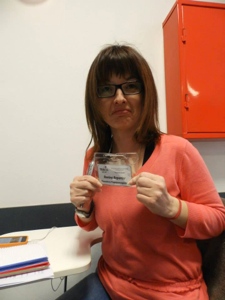 by Theodora Papapanagiotou
by Theodora Papapanagiotou
A few months ago, when and I saw that there was going to be a “Student Voices Issue” for the iTDi blog, I knew just whom I wanted to help me contribute to the issue.
 I have known Helen since kindergarten. Now she is almost 15. We have grown together, year by year, influencing each other. Helen is a huge Harry Potter fan and she has read every Potter book there is, some in Greek and some in English. The impressive thing was that although her level back when she started them in English was not so high, she insisted on reading the book with a dictionary next to her. It took her a lot of time to finish, but she showed real determination to succeed and even gave me motivation to go on as a teacher. She is a very bright young lady, hard working, strict with herself, but also very sensitive. I imagine her in the future as a doctor or perhaps a very knowledgeable scientist like her favourite character from Big Bang Theory, Sheldon Cooper, who is both a genius, and a funny person in his own way. I find myself wondering sometimes if she is actually the teacher and I am the student. I hope you enjoy what she has to say.
I have known Helen since kindergarten. Now she is almost 15. We have grown together, year by year, influencing each other. Helen is a huge Harry Potter fan and she has read every Potter book there is, some in Greek and some in English. The impressive thing was that although her level back when she started them in English was not so high, she insisted on reading the book with a dictionary next to her. It took her a lot of time to finish, but she showed real determination to succeed and even gave me motivation to go on as a teacher. She is a very bright young lady, hard working, strict with herself, but also very sensitive. I imagine her in the future as a doctor or perhaps a very knowledgeable scientist like her favourite character from Big Bang Theory, Sheldon Cooper, who is both a genius, and a funny person in his own way. I find myself wondering sometimes if she is actually the teacher and I am the student. I hope you enjoy what she has to say.
An Ideal Teacher
 Throughout my years as a student I have come across many types of teachers but only a few have fulfilled my expectations. Some were very meticulous while others did perfunctory work. There was also a special category that possessed ”magic powers” like a spell that made everyone sleepy and a special potion, which made a subject indescribably strenuous. So all these thoughts made me wonder, what makes an adequate teacher?
Throughout my years as a student I have come across many types of teachers but only a few have fulfilled my expectations. Some were very meticulous while others did perfunctory work. There was also a special category that possessed ”magic powers” like a spell that made everyone sleepy and a special potion, which made a subject indescribably strenuous. So all these thoughts made me wonder, what makes an adequate teacher?
To start with, the fundamental role of teachers is to zealously hammer interest for the subject and not vigorously prepare students for exams and certain types of exercises. And even if they are obliged to do so, they should avoid the obsolete and conventional teaching methods to curb intellectual stagnation and blandness. The use of digital means in class can trigger the interest of pupils citing from burnout in a vast spectrum. Because of students intimate relation with computers, they memorize information more easily even when you bombard them with an abundance of details.
As for the student-teacher relation and the teacher’s behaviour in class, things here become a bit more complicated. Teachers should be adept, noble and in general role models for their class. Being demanding, frigid and strict isn’t going to help create an assertive and respectable teaching figure. Instead, teachers should shape more profound relations with every student and should not be afraid to deviate from the regular subject. It is also intrinsic to be armed with gruelling endurance and patience because judging the weaknesses of pupils isn’t a characteristic of a seasoned and considerate teacher.
Overall, I believe that the teachers’ goal shouldn’t only be transmitting knowledge but motivating students to search for it on their own. I realize it sounds a bit cliché but only in this way will teaching be a gratifying process for both teachers and students. My advice for all the teachers out there is: be witty and creative, don’t be afraid of exposure and your class will undoubtedly love you!
Helen Gkoura
Now that you have read her article, I hope you realise why I feel she is so special. Her incredible use of expressions and vocabulary in general amazes me every single time I read her work.
Deep inside she is a “normal” teenage girl with all the worries and curiosity of her age. As I mentioned before, she is really strict with herself and even if she knows that she is one of the best students at her school, she always strives to exceed herself. This makes me admire her even more for her wits, her courage to express herself, and her willingness to share her opinions.
Being able to teach and learn from a student like Helen, is like being part of the future in the here and now. Reading Helen’s message to teachers I see that students don’t only care about their own learning. Our students care about us, their teachers, as well. Listening to what our students say creates a chance to keep walking into that future with them together.
Theodora


